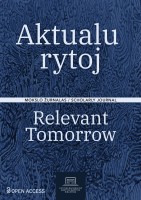Apie žurnalą
eISSN 2669-2899
 Deimantinės atvirosios prieigos recenzuojamą tarptautinį periodinį mokslo žurnalą Aktualu rytoj / Relevant Tomorrow, kurio tikslas – siekti akademinio dialogo ir skatinti tarpdalykinius ryšius socialinių ir humanitarinių mokslų srityse, nuo 2021 m. leidžia Lietuvos nacionalinė Martyno Mažvydo biblioteka
Deimantinės atvirosios prieigos recenzuojamą tarptautinį periodinį mokslo žurnalą Aktualu rytoj / Relevant Tomorrow, kurio tikslas – siekti akademinio dialogo ir skatinti tarpdalykinius ryšius socialinių ir humanitarinių mokslų srityse, nuo 2021 m. leidžia Lietuvos nacionalinė Martyno Mažvydo biblioteka .
Žurnalo tematika: medijų ir informacinis raštingumas; informacinės aplinkos saugumas; komunikacijos ir informacijos mokslų metodologija ir taikomieji tyrimai; skaitmenizacija ir skaitmeninė leidyba; bibliotekininkystė ir bibliografija; tarpdisciplininiai skaitymo tyrimai; dokumentinio paveldo aktualizacija; kultūros istorijos, lituanistikos tematikos tyrimai. Taip pat publikuojamos žurnalo teminiam laukui aktualių mokslinių monografijų, studijų, išleistų Lietuvoje ir užsienyje, recenzijos ir anotacijos.
Publikavimo dažnumas. Vienas tomas per metus. Straipsniai tampa prieinami internete, kai tik yra baigti rengti. Gali būti leidžiami žurnalo teminiai numeriai, atitinkantys žurnalo teminį lauką.
Kalbos. Žurnale publikuojami straipsniai parašyti lietuvių ir anglų kalbomis.
Mokesčiai. Žurnalo autoriams netaikomi jokie straipsnių pateikimo ar publikavimo mokesčiai.
Skelbiamiems straipsniams suteikiami DOI (Digital Object Identifier) identifikatoriai (Lietuvos nacionalinė Martyno Mažvydo biblioteka yra CrossRef narė).
Registruota duomenų bazėse. DOAJ Seal. Lituanistika, Google Scholar.
Lietuvos nacionalinė biblioteka maloniai kviečia autorius svarstyti galimybę spausdinti savo darbus Aktualu rytoj / Relevant Tomorrow žurnale.
Žurnalo viršelio autorė Akvilė Paukštytė.
2026 m. sausio 5 d.
Mokslo žurnalas „Aktualu rytoj / Relevant Tomorrow“ pateko į DOAJ duomenų bazę
Lietuvos nacionalinės Martyno Mažvydo bibliotekos Mokslo ir enciklopedijų leidybos centro nuo 2021 m. leidžiamas deimantinės atvirosios prieigos elektroninis periodinis mokslo žurnalas „Aktualu rytoj / Relevant Tomorrow“ 2025 m. gruodžio mėnesį įtrauktas į tarptautinę bibliografinių duomenų bazę DOAJ (Directory of Open Access Journals). DOAJ ekspertai išvadoje konstatavo, kad žurnalas publikuoja aukšto lygio mokslo publikacijas, kurios aktualios ir tarptautinei akademinei bendruomenei. Tai dar vienas reikšmingas žurnalo įvertinimas tarptautiniu mastu. Iki tol žurnalas buvo registruotas duomenų bazėse Lituanistika ir Google Scholar. Plačiau apie tai skaityti čia.
Žurnalo ištakos ir konceptuali struktūra
Lietuvos nacionalinė biblioteka 2020 m. atnaujino savo leidžiamų mokslo žurnalų publikavimo ir sklaidos strategijas. Vienas iš šio atnaujinimo rezultatų ir yra skaitytojams teikiamas naujas periodinis mokslo žurnalas Aktualu rytoj, 2021, 1 (19) tomas.
Žurnalo pagrindus padėjo Nacionalinėje bibliotekoje leisti tęstiniai mokslo darbai: Bibliografija (buvo leidžiamas nuo 1997 m. iki 2013 m.) ir Bibliotekų tyrimai Lietuvoje (buvo leidžiamas nuo 2015 m. iki 2019 m.). Iš viso išleisti 4 Bibliotekų tyrimų Lietuvoje numeriai, 14 Bibliografijos numerių. Leidinių numeriai (e. versijos formatu) paskelbti šio žurnalo interneto svetainės skiltyje Archyvas.
Tačiau žurnalas Aktualu rytoj ne tik tęsia Nacionalinės bibliotekos mokslo leidybos tradiciją, bet ir žymi atsinaujinimą.
Itin sparčius socialinius, ekonominius ir politinius nūdienės Lietuvos pokyčius bei pasaulio globalinės telematizacijos tendencijas, pasak filosofo Mariaus P. Šaulausko, kiaurai persmelkusias bene visus kasdienio bendrabūvio užkambarius, reikia kritiškai apmąstyti. Kitaip neįmanoma kryptingai prognozuoti valstybės raidos. Atsižvelgus į aktualijas, pokyčius, ir apsispręsta plėsti žurnalo teminį lauką: greta tradicinių bibliografijos, informacijos tvarkybos tyrimų nutarta skelbti straipsnius ir informacinės aplinkos saugumo, medijų ir informacinio raštingumo, informacijos politikos ir komunikacijos procesų, metodologijos klausimais. Tai ir yra žurnalo pagrindinis teminis laukas. O siekiant akademinio dialogo ir tarpdalykinių ryšių, bus publikuojami ir politikos, sociologijos, istorijos mokslų srities straipsniai. Šių tematikų tyrimai ir sudarys žurnalo privalomąją straipsnių dalį.
Kita labai svarbi ir aiški šio žurnalo kryptis – didinti jo tarptautiškumą tiek kalbiniu, tiek teminiu aspektais. Žurnalas yra dvikalbis, straipsniai publikuojami lietuvių ir anglų kalbomis. Ypač kviečiame teikti straipsnius, kuriuose nūdienės visuomenės pokyčiai (susiję su žurnalo teminiu lauku) analizuojami pasitelkus lyginamąją perspektyvą ir tarptautinius kontekstus.
Numatoma skelbti apžvalginius straipsnius apie reikšmingus įvykius, konferencijas ir kitą žurnalo pagrindinę tematiką atitinkančią aktualią informaciją. Bus publikuojamos žurnalo teminiame lauke aktualių mokslinių monografijų, studijų, išleistų Lietuvoje ir užsienyje, recenzijos ir anotacijos. Tekstai sudarys antrą žurnalo dalį – Apžvalgos / Kronika ir Recenzijos.
Siekiniams pasiekti sudaryta tarptautinė redakcinė kolegija.
Straipsniai ir kita publikuojama informacija pasiekiama ir pasieks skaitytojus skaitmeniniu pavidalu.
Šis periodinis leidinys yra deimantinės atvirosios prieigos žurnalas. Žurnalo turinys yra nemokamai pasiekiamas ir suteikiama teisė jį skaityti, išsaugoti savo kompiuteryje, kopijuoti, platinti, spausdinti, atlikti paiešką ar pateikti nuorodą į viso teksto dokumentus. Nėra jokių straipsnių publikavimo mokesčių, o autorius išlaiko visas turtines autorių ir gretutines teises (Plačiau apie tai žr. Žurnalo politika).








